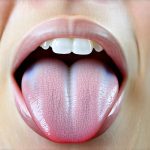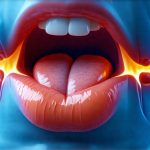Bad breath, or halitosis, is often dismissed as a minor inconvenience, something easily masked with mints or mouthwash. However, increasingly sophisticated research reveals that persistent bad breath, coupled with changes in the tongue’s appearance and overall oral health, can be a significant indicator of deeper systemic issues – specifically, an imbalance within the gut microbiome. For years, we’ve focused on oral hygiene as the primary determinant of breath quality, but this overlooks the intricate connection between our digestive system and our mouths. A healthy mouth isn’t simply about brushing and flossing; it’s a reflection of overall health, deeply interwoven with the trillions of microorganisms residing in our gut. Recognizing these subtle signs can be the first step toward addressing underlying imbalances and restoring not just fresh breath but also holistic wellbeing.
The gut microbiome – the vast community of bacteria, fungi, viruses, and other microbes living in our digestive tract – plays a pivotal role in everything from nutrient absorption to immune function. When this ecosystem is disrupted by factors like poor diet, stress, antibiotic use, or chronic illness, it can lead to an overgrowth of certain bacteria and a reduction in others. This imbalance isn’t confined to the gut; it directly impacts oral health through what’s known as the “gut-mouth axis.” Harmful compounds produced during gut dysbiosis can travel throughout the body, influencing the types of microbes that thrive in the mouth, causing inflammation, and ultimately contributing to unpleasant breath, a coated tongue, and alterations in the oral microbiome. This is why addressing gut health may be crucial for long-term oral wellbeing.
The Gut-Mouth Connection: How Digestion Impacts Breath & Oral Health
The relationship between the gut and the mouth is bidirectional – meaning they constantly influence each other. A healthy gut supports a balanced oral microbiome, which in turn aids digestion by initiating the breakdown of food. Conversely, an unhealthy gut can lead to systemic inflammation that compromises oral tissues and alters breath quality. This isn’t merely about what you eat; it’s about how well your body digests what you eat. Incomplete digestion provides fuel for undesirable bacteria in both the gut and the mouth, exacerbating imbalances.
- Undigested food ferments in the gut, producing volatile sulfur compounds (VSCs) – primary culprits behind bad breath. These VSCs are absorbed into the bloodstream and exhaled through the lungs, resulting in noticeable odor.
- Gut dysbiosis can increase intestinal permeability (“leaky gut”), allowing bacterial toxins and inflammatory molecules to enter the bloodstream, further impacting oral health and contributing to systemic inflammation.
- Imbalances in gut bacteria affect nutrient absorption. Deficiencies in essential vitamins and minerals (like vitamin D, zinc, and B vitamins) weaken the immune system and compromise oral tissues.
The oral microbiome itself is incredibly diverse; a healthy mouth contains hundreds of bacterial species. However, an imbalanced gut often leads to a reduction in beneficial oral bacteria and an overgrowth of odor-producing microbes, disrupting this delicate balance. This disruption can manifest as changes in the tongue’s appearance, such as a white or coated tongue, which is a strong indicator of microbial imbalances related to microbiome health. The type of coating on your tongue can also offer clues – a thick, white coating might suggest fungal overgrowth linked to an unhealthy gut, while a yellowish coating could indicate digestive issues.
Recognizing the Signs: Breath, Tongue, and Oral Microbiome Indicators
Persistent bad breath that doesn’t respond to standard oral hygiene practices is often the first signal. It’s important to differentiate between transient bad breath caused by food (garlic, onions) and chronic halitosis. Chronic halitosis, especially when accompanied by other symptoms, warrants further investigation into gut health. A key characteristic of gut-related bad breath is its persistence even after meticulous oral care; it’s not simply masked but seemingly returns quickly. This suggests the source isn’t localized to the mouth.
Beyond breath itself, pay attention to your tongue. A healthy tongue should be pink and covered in small papillae – tiny bumps that give it a textured appearance. Changes to look for include:
– A white coating: Often indicative of fungal overgrowth (candida) which can flourish with gut imbalances.
– A yellow or brownish coating: Suggests digestive issues, potentially related to bile reflux or inadequate digestion.
– Smooth tongue: Loss of papillae can indicate nutrient deficiencies linked to impaired gut absorption.
Finally, consider changes in your mouth’s overall feel. Increased sensitivity, gum inflammation, dry mouth, or a constant need to clear your throat could all be signs of an underlying imbalance triggered by gut dysbiosis. These seemingly unrelated symptoms are often interconnected and point toward the need for a more holistic approach to oral health. You might also consider if acid is affecting your vocal health, as these can be linked.
Addressing Gut Health for Oral Wellbeing: Dietary Strategies
Diet plays a crucial role in both causing and resolving gut imbalances. A diet rich in processed foods, sugar, and unhealthy fats feeds harmful bacteria in the gut, while a whole-foods based diet supports beneficial microbes. Here are some dietary strategies to consider:
– Increase fiber intake: Fiber acts as a prebiotic, feeding beneficial bacteria in the gut. Good sources include fruits, vegetables, legumes, and whole grains. Aim for 25-35 grams of fiber per day.
– Reduce sugar consumption: Sugar feeds harmful bacteria and contributes to inflammation. Limit sugary drinks, processed foods, and refined carbohydrates.
– Incorporate fermented foods: Foods like yogurt (with live cultures), kefir, sauerkraut, kimchi, and kombucha contain probiotics – beneficial bacteria that can help restore gut balance.
Consider an elimination diet under the guidance of a healthcare professional to identify potential food sensitivities or intolerances that may be contributing to gut inflammation. Hydration is also essential for optimal digestion and gut health; aim to drink at least eight glasses of water daily. It’s not about restrictive dieting, but rather about making conscious choices that nourish both your gut and your mouth. Practicing food rituals can help immensely with this process.
Probiotics & Prebiotics: Supporting a Balanced Microbiome
Probiotics are live microorganisms that, when consumed in adequate amounts, confer a health benefit on the host. While probiotics can be helpful, it’s important to understand they aren’t a one-size-fits-all solution. Different strains of probiotics have different effects, and what works for one person may not work for another.
– Choose probiotic-rich foods: As mentioned previously, fermented foods are excellent natural sources.
– Consider a probiotic supplement: If supplementing, choose a high-quality product with multiple strains and consult with your doctor to determine the appropriate dosage and strain for your needs.
Prebiotics are non-digestible fibers that serve as food for beneficial bacteria in the gut. Combining probiotics and prebiotics (synbiotics) can enhance their effectiveness. Good prebiotic sources include:
– Onions, garlic, leeks
– Asparagus, bananas, apples
– Oats, barley
A healthy gut requires a diverse microbial community; focus on nourishing both the beneficial bacteria with prebiotics and replenishing them with probiotics when necessary. Remember that gut health is not just about adding good bacteria – it’s also about minimizing factors that disrupt the existing balance. If you suspect your gut needs help, consider looking at gut transit time.
Lifestyle Factors & Seeking Professional Guidance
Beyond diet, several lifestyle factors can significantly impact gut health and consequently, oral health. Chronic stress disrupts the gut microbiome and increases inflammation. Implementing stress-management techniques like yoga, meditation, or deep breathing exercises can be beneficial. Regular exercise promotes gut motility and improves overall wellbeing. Antibiotic use, while sometimes necessary, can also disrupt the gut microbiome; discuss alternatives with your doctor whenever possible and consider probiotic supplementation after antibiotic treatment.
If you are experiencing persistent bad breath accompanied by changes in your tongue’s appearance or oral health, it’s crucial to seek professional guidance. A dentist can assess your oral condition and rule out local causes of halitosis. A gastroenterologist or registered dietitian specializing in gut health can help identify underlying imbalances and develop a personalized plan to restore gut function. They may recommend stool testing to analyze your microbiome composition and guide targeted interventions. Don’t self-diagnose; addressing the root cause requires a comprehensive evaluation and tailored approach. Focusing on both oral hygiene and gut health is the key to long-term fresh breath and optimal overall wellbeing. You can even explore tools linking gut health and mental well-being for a holistic approach.


















